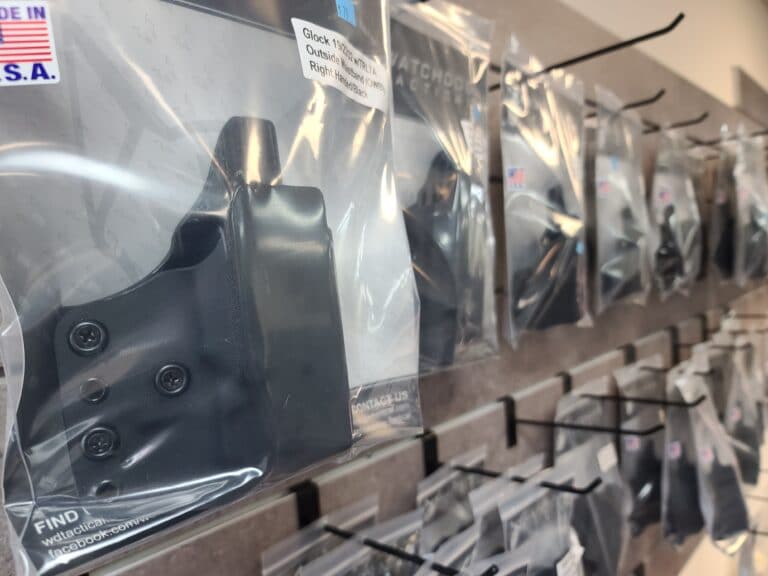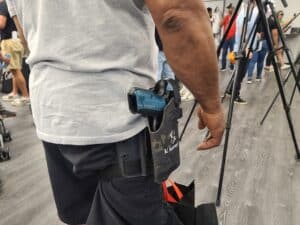A federal judge may have allowed New York’s Concealed Carry Improvement Act (CCIA) to take effect, but that doesn’t mean the law is constitutional. In fact, the opposite is likely true.
On Wednesday, US District Judge Glenn Suddaby rejected an attempt by gun-rights advocates to block the state’s new concealed carry law from going into effect and dismissed the suit without prejudice. He did so after determining the plaintiffs in the case, Gun Owners of America, “failed to demonstrate standing.”
The decision means that New Yorkers hoping to legally carry a gun for self-defense are under heightened restrictions starting Thursday, much to the delight of the state’s elected officials. Governor Kathy Hochul (D.) took the dismissal as legal approval of the new carry regime.
“A federal court has dismissed Antonyuk v. Bruen and denied the motion for a preliminary injunction,” Hochul tweeted. “This is a just and right decision, and our smart, sensible gun laws will go into effect as planned tomorrow to keep New Yorkers safe.”
New York Attorney General Letitia James (D.) also took a victory lap.
“The gun lobby is trying to destroy New York’s common-sense gun law,” she said in a tweet. “We beat them in court. Let’s go.”
But their optimism is likely short-sighted given the full scope of Judge Suddaby’s reasoning. He’s quite frank about his thoughts on the legality of New York’s gun-carry replacement law in his analysis of the merits.
“While pursuing the laudable goal of public safety, and in an attempt to curb ever-increasing mass shootings, the New York State Legislature has generated an unconstitutional statute in the CCIA,” he wrote. “In it’s eight-day haste to pass a legislative response to the Supreme Court’s Decision in NYSRPA, (which reads less like such a measured response than a wish list of exercise-inhibiting restrictions glued together by a severability clause in case some of the more fanciful restrictions were struck down), the New York State Legislature forgot four important words–‘other than in self-defense.'”
In the judge’s eyes, New York passed a blatantly unconstitutional gun law by throwing a bunch of spaghetti at the wall to see what sticks. That’s certainly not the impression you want to give to the courts if you’re hoping to pass a new gun carry regime with any sort of staying power.
Judge Suddaby noted that the law’s “good moral character” requirement “does not remove the open-ended discretion” that the Supreme Court said was unconstitutional in relation to New York’s previous “proper cause” requirement. He also said he didn’t find the law’s social media check requirement or the expansive list of “restricted places” to be consistent with the nation’s historical tradition of firearms regulation as required under the Supreme Court’s earlier Bruen decision.
Indeed, it seems based on the legal reasoning that New York’s law was simply saved by a technicality, and its days may be numbered. The suit was dismissed without prejudice, meaning the plaintiffs can file another suit on the same cause of action at a later date, provided the standing issue is resolved.
Ultimately, they may not even have to. The same day the GOA suit was being dismissed, the New York State Rifle and Pistol Association filed its own lawsuit against New York’s law in the very same federal court.
Provided standing is not again at issue in this latest suit, it seems quite likely that the plaintiffs will have all the support they need to have New York’s onerous gun-carry regime blocked in court. And when they do, that spells bad news for the handful of other formerly may-issue states hoping to make the process for lawful gun carry as arduous as possible in the post-Bruen landscape.
States like California immediately come to mind. Lawmakers there came just two votes shy of passing a copycat bill Wednesday night only because they shot for the moon in an attempt to have the law take effect immediately. Had they simply authored the bill take effect at a later date, California gun owners would be under nearly identical restrictions as New Yorkers in order to obtain a permit and carry a firearm lawfully.
California lawmakers have already pledged to reintroduce their bill next session and, with the benefit of having learned their lesson, will almost surely find a way to get it passed the next time around.
A victory for gun-rights challengers against the New York law, while no guarantee of similar success, would go a long way toward casting doubt on the viability of California’s replacement law, should it ultimately pass.







Only Members can view comments. Become a member today to join the conversation.